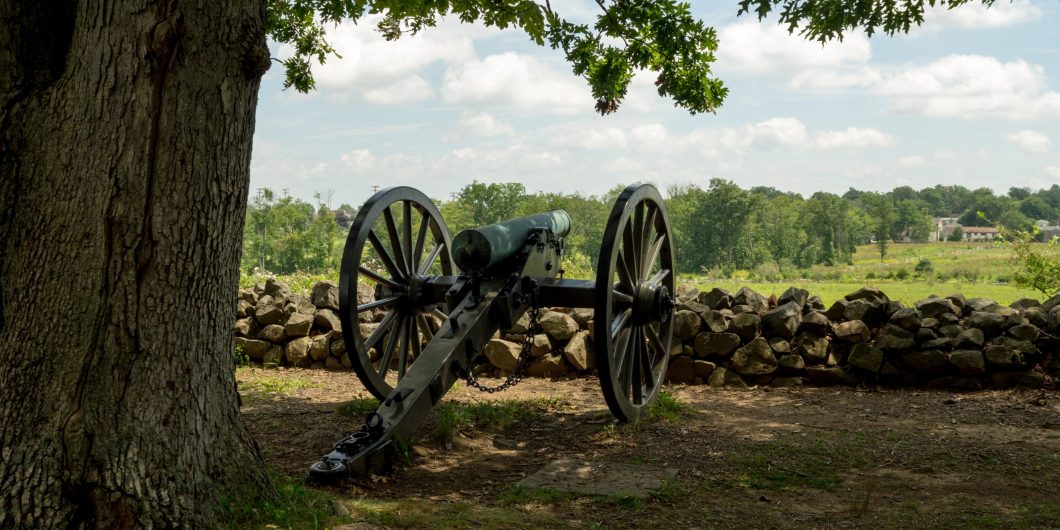When Legend Becomes Fact
Americans’ love for their country is at an all-time low. A recent Gallup poll revealed that only 38% of adults say they are extremely proud to be an American. We all know that ongoing debates over education, immigration, election security, and the coronavirus pandemic have exacerbated the lack of pride and faith in our political institutions, but they are not the only reasons why love for our country is at an all-time low.
“The challenge today is the idea that an ugly founding cannot produce citizens who love their country,” argues Gordon Lloyd of Pepperdine University, and he is right. Our declining political faith arises from how we understand our part in the larger American narrative. Educational efforts like A People’s History of the United States and many aspects of the 1619 Project have had costly effects on the civic mind. Increasingly, Americans view our founding as ugly, and we project that ugliness onto all aspects of our history.
What is needed now is a reminder that, while our founding is not perfect, it is far from ugly. For this task, there is no better historical figure to turn to than our sixteenth president, Abraham Lincoln, and no better speech to turn to than his Gettysburg Address, given 159 years ago this Saturday.
The power of Gettysburg resides in the story that Lincoln tells. Lincoln was known by political friends and adversaries alike to be a skilled humorist and thoughtful storyteller. Gettysburg’s story is of a nation dedicated to good principles, how it has failed to live up to them, and the terrible price that it must pay to rededicate itself to those principles once again. In Gettysburg, a small, unremarkable crossroads town in the heart of Pennsylvania, Lincoln reminded a war-torn nation that a people’s union can endure and become more perfect.
It is no wonder why the 272-word speech has been etched into memorials, recited by presidents and prime ministers alike, and memorized by schoolchildren for generations. However, the story Lincoln tells of the promise, pitfalls, and prospects of renewal for democratic government is in no way unique. It is one that he told many times before.
Gettysburg is the ideal counter to the Howard Zinns and Nicole Hannah Joneses of the world because it is the most concise defense of a good but imperfect founding. Lincoln’s larger collection of speeches, letters, and fragments reveals how deep his respect for the Founding generation went. One such instance is his 1842 Temperance Address, delivered to the Washingtonian Society in Springfield. Consider these excerpts from the conclusion of the speech:
Of our political revolution of ’76, we all are justly proud. It has given us a degree of political freedom, far exceeding that of any other nation of the earth. In it the world has found a solution of the long mooted problem, as to the capability of man to govern himself. In it was the germ which has vegetated, and still is to grow and expand into the universal liberty of mankind.
But with all these glorious results, past, present, and to come, it had its evils too. It breathed forth famine, swam in blood and rode in fire; and long, long after, the orphan’s cry, and the widow’s wail, continued to break the sad silence that ensued. …
And when the victory shall be complete—when there shall be neither a slave nor a drunkard on the earth—… How nobly distinguished that People, who shall have planted, and nurtured to maturity, both the political and moral freedom of their species.
To fully appreciate Gettysburg’s poetic vindication of an imperfect founding, it is important to understand that this oft-forgotten passage from the Temperance Address is a blueprint of sorts for the themes, structure, and imagery immortalized in the 1863 address. Between these two speeches, Lincoln’s mythologized account of the Founding generation produces an affection for our institutions and history that America has surrendered.
Both the Temperance Address passage and Gettysburg proceed in a linear fashion. Each begins with the Declaration’s promise, of the “political revolution of ’76,” as Lincoln refers to it in Temperance. In this revolution, Lincoln correctly asserts that the Founding generation dedicated the nation to the proposition that all men are created equal and proved that mankind could, in fact, govern itself.
Perhaps unwittingly, Lincoln crafted his American mythology as a democratic counterpart to the classical mythology of the Greco-Roman world, which relies upon emphasizing how high mankind had risen from its primal state. Consider how Lincoln only alluded to the time before America when speaking about the great miseries the political revolution alleviated in Temperance, a passing acknowledgment before celebrating the triumphs it secured. No such connection is made in Gettysburg.
The reasons for Lincoln beginning with the moral and political triumph of the Declaration are two-fold: First, it establishes the noble end of American government. Second, it sets up the nation’s history for the inevitable tragedy that will never perfectly reach that end. This undergirds Lincoln’s transition to the present moment and the pitfalls of creating a liberal democracy upon such principles. In his examination of the present, Lincoln’s narrative offers a striking blow to those who exalt the Founders at the expense of their human imperfections and moral failures. While granting more political freedom than any other nation on earth at the time, America also “swam in blood and rode in fire” and found itself “engaged in a great civil war.”
The injustices Lincoln alludes to were real and deeply concerning to him and others in 1842 and 1863. Not only was chattel slavery expanding in 1842, but recorded cases of lynching increased, abolitionist newspapers were destroyed, and their editors assaulted. 1863 saw the nation at the height of a war that threatened to eliminate the possibility of liberal democracy and protecting human equality, with over 170,000 men fighting at the battle of Gettysburg alone. An estimated 47,000 died, making it the costliest battle in United States history and among the bloodiest witnessed by the modern world.
The promise of the Founding is still ours to save and ours to lose. If we want to avoid losing it once more, we must learn again to love what our country can be.
Calling to mind the great unrest in the American mind and spirit during the nineteenth century, Lincoln reminded his fellow citizens that there is still something in America worth loving. Our institutions, though human and full of error, were constructed with the tools to be amended by the will of the people. In rallying behind the promise of the Founding and accepting the failings of the nation, Lincoln knew that Americans have the opportunity to make the nation more perfect and, therefore, more worthy of our love.
This sets the stage for the future that Lincoln envisions and the prospect for America’s renewal. In uncharacteristically theatrical language, Lincoln speaks in the Temperance passage of a time when the “universal liberty of mankind” would be secured once America confronted and overcame the evils of intemperance and slavery. “How nobly distinguished that People, who shall have planted, and nurtured to maturity, both the political and moral freedom of their species.” We famously see this again in Gettysburg when Lincoln declares that, should the Union emerge triumphant in the war and slavery be abolished, America would prove that “government of the people, by the people, for the people, shall not perish from the earth.”
In both instances, Lincoln’s optimistic outlook on the future is rooted in both recognition of the good and acceptance of the evil that the Founding could not eradicate. The goal of this two-decade rhetorical project was not to double down on the evils that the early republic perpetuated, nor was it to suggest that the nation’s past is simply black and white like many historians claim today. Lincoln’s mythology was designed to vindicate the social order of the Founding generation, built upon principles of equality and the virtue of representative government. In doing so, it reignites hope in the possibilities of our political experiment.
Unlike most myths from antiquity, where the legend became fact, Lincoln’s mythology is built on and sustained by the plain reading of the Founding generation and an acute understanding of their relationship to the rest of American history. It is the type of thought and prose that the Zinns and Hannah Jones of the world reject because it does not paint history as black and white, oppressor and oppressed. And while many Americans today reject the wisdom of the past, Lincoln embraced the Founding without discounting the evils it could not eradicate.
In recognizing the good along with the bad, Lincoln’s democratic mythology gives us hope that our political circumstances can be overcome in the twenty-first century. It reminds us that our Founding is not ugly and therefore permits us to love our country again.
In his 1862 annual message to Congress, Lincoln declared: “We shall nobly save, or meanly lose, the last best hope of earth.” While most certainly true for Lincoln and his contemporaries, it is no less true for us today. The promise of the Founding is still ours to save and ours to lose. If we want to avoid losing it once more, we must learn again to love what our country can be. And to help us, there is no better figure to turn to than Mr. Lincoln.



